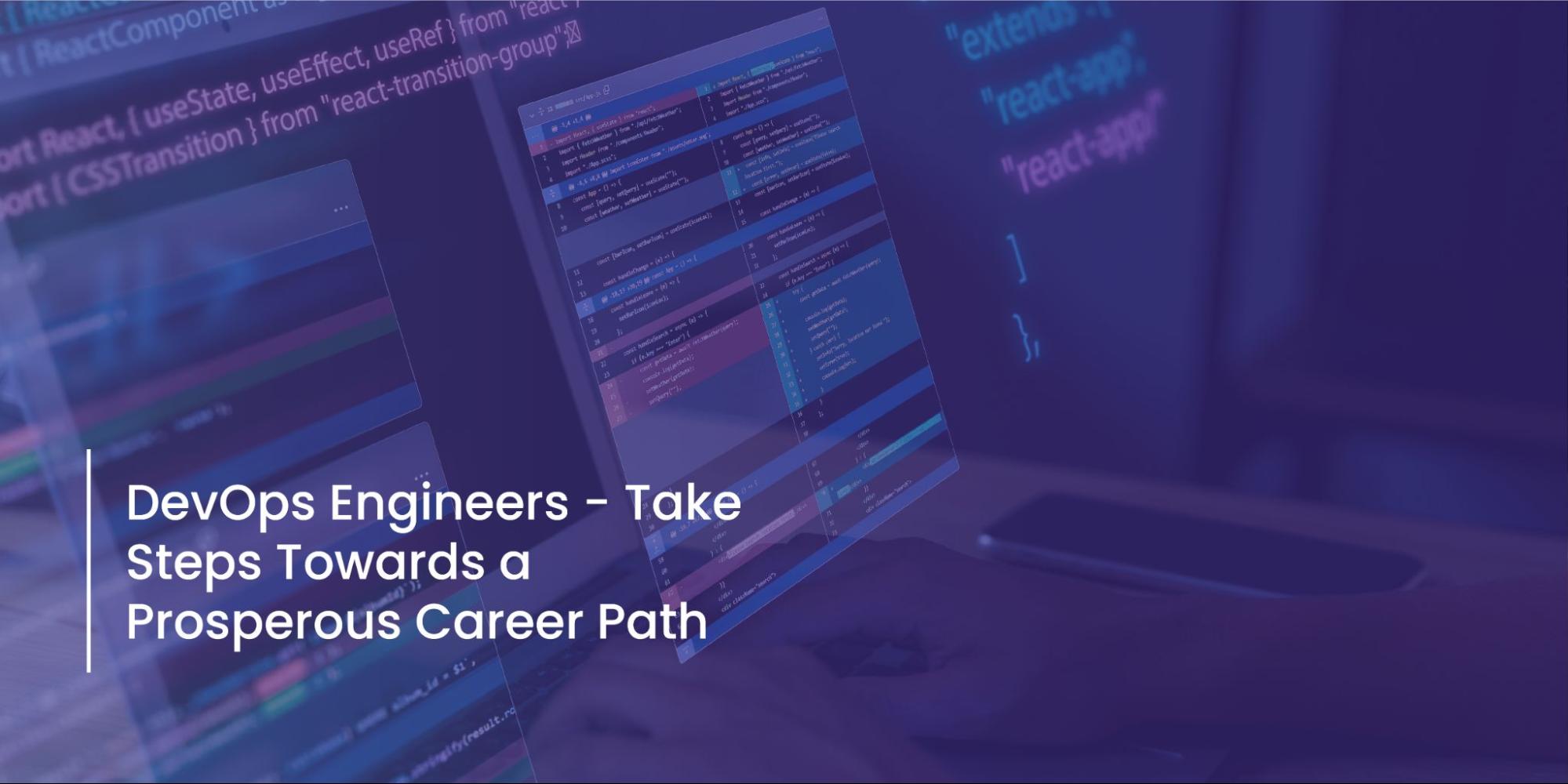
DevOps Engineers – Take Steps Towards a Prosperous Career Path
In this data-driven world, most businesses struggle to provide quick and effective software solutions. Given the complex nature of this task, DevOps engineers come into action. They are involved in the coding, deployment, and maintenance of software throughout its development life cycle. Additionally, they adopt certain strategies, tools, and methods that ensure a seamless software integration journey. Working in these technical fields can be captivating and lucrative for them. According to a 2023 study, almost 36% of developers wanted to start their journeys as DevOps engineers. However, the central question asked by most of the audience passionate about DevOps development careers is this: how do they begin? How do they become a successful DevOps engineer? This guide will address all these queries and let the candidates know how they can choose these profitable careers.
DevOps Engineering Domain – An Intensely Competitive Tech Industry
The primary job of a DevOps engineer is to ensure that the infrastructure of software is built, tested, and maintained so that it is ready to be released. Once deployed, these engineers can also adopt strategies that ensure it is well maintained.
Moreover, it is all about merging tools and processes to improve transparency levels and teamwork to achieve appropriate outcomes with real-time approaches. Working in these tech-driven environments means the candidate must know how to automate and innovate their ideas. Developing a transformative career in this field requires DevOps engineers to gain certain insights; let’s explore that further.
Quick Insights into DevOps Development
DevOps engineers present the operations, equipment, and techniques to equalize software development life cycle requirements. Ranging from programming, and deployment to supporting and updating processes, DevOps does it all. They are also responsible for streamlining the business’s IT infrastructure and collaborating with the development teams for deployment and code management processes.
Additionally, Morder intelligence highlighted the global market value of DevOps development as $29.43 billion by 2029, up from $10.74 billion in 2023, with a CAGR of 22.34% during the forecast period of the upcoming 5 years. This ratio shows the importance and scope of agile methodologies in a fast-paced world. But how does one achieve that? There are some simple requirements for becoming a DevOps engineer.
Basic Requirements for Becoming a DevOps Engineer
DevOps engineering offers a tremendous possibility that demands experts to transform imaginative ideas into reality. They are IT specialists who understand programming, infrastructure management, and technical frameworks. Additionally, interpersonal skills are also necessary for the selected candidates if they want to fit within these collaborative environments. Familiarity with conventional developer tool kits is also essential in this field, including getting code audits, writing unit tests, and ensuring agile strategies.
Categories of DevOps Jobs
DevOps jobs are further divided into three categories. Individuals are hired depending on their experience levels. These are:
- DevOps Software Development at Entry-Level
- Automated DevOps Software Development at Mid-Level
- DevOps Software Development at Senior Level
Professional Growth for DevOps Engineers
Before getting deep into their targeted fields, every candidate wants to know the kind of careers they can get into once they become DevOps engineers. These specific platforms will allow the applicants to gain the following:
- Expertise in cloud-computing platforms like Google Cloud, Microsoft Azure, or Amazon web services.
- Proficiency in achieving seamless collaborations
Top 5 Goals for DevOps Engineering
In this dynamic world where every company is out there to develop the most transformational software, establishing concise ambitions in the workplace is necessary to address the pressing concerns of bespoke software development. Candidates who can deeply understand diverse careers related to fields can easily approach the platform according to their interests. There are a few goals on which the applicants focus so they can brighten up their future pathways. These objectives are mentioned below:
Tool Mastering
Technical proficiency is a must-have for all applicants interested in DevOps engineering. These engineers can master skills such as cloud computing, coding and scripting, and software testing. The ultimate reason behind polishing these skills is to make the DevOps engineer more productive. After attaining this mastery, the specialists become proficient in designing quick, flexible, and effective CI/CD pipelines that adhere to changing requirements.
Automate Tasks
DevOps is not about improvements for one time; it provides continuous advancement in both software development and deployment processes. The candidates must know how to improve the evolved recurring operations and incorporate innovative measures for prosperity. By doing so, DevOps engineers can simplify operations and bring a culture of relentless growth.
Communication Improvement
Being a DevOps engineer doesn’t mean that the candidate is performing their technical tasks and is done with their duties. They must work on their interpersonal skills, including communication skills with team members.
Think Outside the Box
A DevOps engineer must know how to think beyond the basic ideas. During these initiatives, DevOps practices will be aligned with business goals. When the candidates develop these thoughts, they can make innovative decisions; this assists them in becoming a driving force behind the company’s progress.
Personal Branding
In a globalized society, establishing a personal brand can accelerate success and open doors for innovative possibilities. The objectives regarding branding services are to provide open-source projects, communicate with others at business meetings, or contribute to pioneering thought blogs.
DevOps Software Development Process – The Key Steps for Maintenance

DevOps software development is a life cycle and is divided into the following steps:
Strategising Phase
Before starting a successful DevOps process, planning plays an essential role. The strategizing phase assists the engineers in providing an outline for setting KPIs. Additionally, it helps develop a cooperative and effective software delivery for the business.
Ongoing Advancement Phase
After the strategizing process, DevOps development enters into the ongoing advancement phase. The initial stage includes writing, auditing, and evaluating codes, whereas the following process is for operating functional tests, compiling source code, and originating viable products or packages.
Data-Driven Analysis Phase
The days are gone when the companies had to debug the issues manually. Now, they employ AI-powered evaluation, through which all their troubleshooting processes can be performed in real-time. With the advent of technological advancement, businesses save time and improve their overall performance.
Continuous Implementation Phase
During this phase, DevOps engineers transform codes into production servers; here CI and CD pipelines assist significantly. When the codes go through the necessary testing and audits, CI/CD pipelines further assist in automating the implementation process, ensuring on-time deliveries to production servers.
Ongoing Evaluation Phase
Ongoing monitoring is one of the essential stages within the DevOps lifecycle, as it helps the units evaluate the app performances, conduct user analysis, and ensure server health state, and safety. In this process, the software performs linear assessments, offering real-time detection of anomalies.
Continuous Enhancement Phase
Depending on the client reviews, software evaluation details, and IT demands, the DevOps engineer units repeat the app procedure. Gradually, they reexamine all preceding lifecycle steps to deploy innovative features and improvements.
Core Responsibilities of DevOps Jobs
DevOps engineers have to evaluate and address the technical problems; therefore, their responsibilities include but not limited to:
- Automating Operations
- Team Collaborations
- System Implementation
- Infrastructure Management
- Preventive Maintenance
- App Deployment in Separate Spaces
- Ongoing Monitoring
- DevOps Tool Management
Remote DevOps Jobs – Work From Anywhere
DevOps platforms offer remote jobs for potential candidates so they can work in a flexible environment and do not have to pay for the commute. The most prominent teleworking jobs in this technical field are listed below:
- DevOps Engineer
- Reliability Engineer
- System Engineer
- DevOps Architect
DevOps IT solutions – Stay Updated With the Modern Trends
According to Markets and Markets, the DevOps market size is expected to reach $25.5 billion by 2028, up from $10.4 billion at a CAGR of 19.7% during the forecast period of the upcoming 4 years. A DevOps engineer must be updated with modern trends to provide groundbreaking ideas in reality. Specialists can follow the following tips to become aware of industrial standards. They are:
- Follow professional partners on social media.
- Make associations with the specialists on blog platforms that post on the same notions.
Polish the Inner DevOps Skills with Programmer Force
Have you felt stuck within the DevOps career? Programmer Force is here to assist you with some exciting opportunities. Passionate candidates with expertise can apply as DevOps engineers and enjoy their diverse perks. Our organization provides diverse perks for its employees; so therefore, they can reach their full potential. With a competitive salary, additional benefits, and professional teams, PF is here to navigate you through tough waters. For more details, visit our website and let us know if you have concerns.






